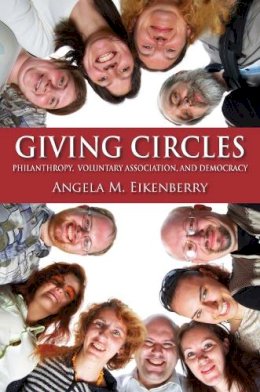Angela M. Eikenberry is Assistant Professor in the School of Public Administration at the University of Nebraska, Omaha. She has worked as a development consultant and is a member of a giving circle.
"This book is positioned as a riposte to Robert Putnam's famous assertion that we are now 'Bowling Alone' due to the collapse of community. Eikenberry believes that giving circles are one example of a new form of citizen participation which demonstrates that it may be the forms rather than the quantities of engagement that have changed in recent years. Giving circles involve pooling donations and making collective decisions about how to give the pooled funds away. Data on the size, scope and impact of the giving circle movement are provided. The wider scope of this book is a result of Eikenberry's belief that giving circles are more than just a new method for organising the transfer of funds from private individuals to good causes. This is an ambitious and readable account of the appropriate role for voluntary action in modern societies, and poses an important argument that as philanthropy is primarily designed to meet the needs of donors rather than recipients, there is an essential ongoing role for government in meeting basic social welfare needs."—Beth Breeze, Publications Editor, Philanthropy UK Nwsltr, Issue 38, Sept. 2009 "In this book, Eikenberry (Univ. of Nebraska, Omaha) bridges several research programs. She draws heavily from interest group scholars examining social capital as well as public administration scholars analyzing postmodern conceptions of governance beyond the state. The result is an examination of new forms of associations referred to as giving circles. Through case studies and in-depth interviews, Eikenberry finds that these groups rely upon individuals coming together to pool their resources for common causes. She suggests that the giving circle universe varies greatly. However, all giving circles seek to educate members about community issues, engage members in voluntary efforts, provide social networking opportunities for members, and work to maintain their donors' independence from specific charities. In addition to documenting and classifying these groups, Eikenberry questions whether giving circles engender both procedural and substantive democracy. She posits that while giving circles may provide more opportunities for democracy within groups, not all peoples or issues take part in or are the targets of the philanthropy produced by giving circles. In sum, this book uses original data and presents a novel approach to group politics that should be explored further by scholars from various disciplines. Summing Up: Recommended. General readers, upper-division undergraduate students, and above. — Choice"—R. M. Alexander, Ohio Northern University, March 2010 "This is an ambitious and readable account of the appropriate role for voluntary action in modern societies, and poses an important argument that as philanthropy is primarily designed to meet the needs of donors rather than recipients, there is an essential ongoing role for government in meeting basic social welfare needs.Issue 38, Sept. 2009"—Beth Breeze, Publications Editor "In sum, this book uses original data and presents a novel approach to group politics that should be explored further by scholars from various disciplines. ...Recommended. General readers, upper-division undergraduate students, and above.March 2010"—Choice "By illuminating small philanthropic organizations and participatory groups, Giving Circles makes a valuable contribution toward a more comprehensive understanding of the voluntary sector. 39(5)"—Nonprofit and Voluntary Sector Quarterly "A very important contribution . . . it situates questions about philanthropy and voluntary association within the framework of recent vast changes in government responsibilities, as well as significant increases in income disparities in the United States. . . . A truly critical and clear-sighted analysis of the difficulty facing the philanthropic and voluntary sectors in replacing the role of government."—Camilla Stivers, Levin College of Urban Affairs, Cleveland State University "Giving circles are inherently interesting voluntary associations and the description of how they operate makes fascinating reading."—Thomasina Jo Borkman, George Mason University

